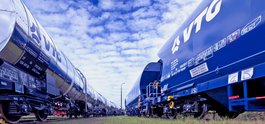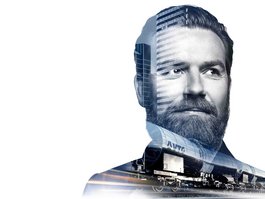In the 2019 financial year, VTG Aktiengesellschaft realized Group revenue of EUR 1.22 billion, an increase of 14 percent on the previous year (2018: EUR1,073 million). The improvement was even more significant in terms of earnings before interest, taxes, depreciation and amortization (EBITDA): At EUR 512 million, VTG recorded growth of 47 percent compared to the previous year (2018: EUR 349 million). The EBITDA forecast of EUR 480 to 510 million communicated by the Executive Board in February 2019 was thus slightly exceeded. The disproportionately strong increase in earnings compared to revenue is due to operational improvements in all three divisions – Railcar, Rail Logistics and Tanktainer – and to positive one-time effects overall. "We can be very satisfied with the 2019 financial year and are proud of the best result in the company's history," said Dr. Heiko Fischer, Chairman of the Executive Board of VTG AG. "This comes as clear evidence that we have in the past charted the right course for the future of VTG – not least thanks to the smoothly integrated takeovers of recent years. It is particularly gratifying that all three divisions were able to contribute to the good result by improving their operating business. From this strong position, we are determined to face the current crisis and pressing ahead with our consistent course of internationalization, digitization and innovation – as far as the present developments around the spread of the coronavirus allow".
Operational improvements, Nacco acquisition and new accounting standard
The positive result described above is based on a number of factors. In 2019, Railcar benefited from successful integration of the Nacco Group and was also able to significantly increase its revenue from operations. For the year as a whole, global fleet capacity utilization was at the same level as in the previous year, but fell very slightly to 92.3 percent at the balance sheet date (2018: 93.5 percent). Rail Logistics also considerably increased its revenue thanks to the acquisition of new business, while the Tanktainer Division also recorded an increase in revenue – albeit only a moderate one due to international trade conflicts and the weakening global economy. Overall, Group revenue was at the upper end of the forecast range of EUR 1.15 to 1.25 billion formulated at the beginning of the year. The significant increase in EBITDA is also attributable to improvements in all three business areas. However, the main earnings drivers here were the acquisition of the Nacco Group, which contributed EUR 66 million to Group EBITDA (previous year: EUR 16 million), and the absence of a large part of the related integration and transaction costs (previous year: EUR 19 million). The first-time application of the new international accounting standard IFRS 16, according to which obligations from operating leases must be accounted for by the lessee, led to an additional positive EBITDA effect of EUR 64 million, which significantly overcompensated for the extraordinary costs incurred for integration expenses, delisting and the capital increase (EUR 7.5 million). Adjusted for all extraordinary costs, EBITDA was even higher at EUR 519.9 million.
Target achieved: earnings per share at EUR 2.92
The Executive Board first announced its target of increasing earnings per share (EPS) to EUR 2.50 by 2018/2019 – almost three times the figure for the 2014 financial year (EPS: EUR 0.93) – in September 2015. The figure of EUR 2.92 per share reached in the financial year under review clearly exceeded this target. Compared to the previous year, VTG thus saw its EPS increase by 189 percent (2018: EUR 1.01).
New allocation of Executive Board for regional orientation – Importance of rail freight transport in view of the corona virus higher than ever
At Group level, 2019 saw new appointments and the expansion of the Executive Board. VTG took an important strategic step by creating two new Executive Board portfolios that are broken down more by regional criteria than by business segment. Since September 1, 2019, Sven Wellbrock, formerly head of the European Railcar Division, has been responsible for railcar and rail logistics business in Europe in his capacity as COO Europe. Oksana Janssen, previously head of the Railcar Russia business segment, now serves as COO Eurasia & Far East for railcar business in the Eurasian region, for tank container and project logistics activities and for services provided along the Silk Road. "These new Executive Board portfolios and the associated reorganization of our business activities strengthen our competitive position. Closer integration of the railcar and logistics units will enable us to offer our customers an even more comprehensive range of services, and to model transport chains better, faster and more comprehensively. In view of the current situation surrounding the coronavirus, this is more important than ever. Right now, we are clearly seeing the importance of international rail freight transport for the security of supply lines throughout Europe," says Dr. Heiko Fischer. "We are fully aware of this responsibility. The strengths of rail freight include the transportation of large quantities with relatively few personnel. Our employees, especially in the plants, in mobile service, on the trains and in the dispatching and control centers, are doing everything in their power to guarantee the ongoing smooth flow of goods. Especially those that cannot work from home, but are on-site to ensure smooth supply chains for us all, are among the heroes of our times. Our thanks go to them. "



